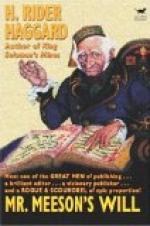“(I.) The plaintiff is the sole and universal legatee under the true last will of Jonathan Meeson, deceased, late of Pompadour Hall, in the County of Warwick, who died on the 23rd of December, 1885, the said will being undated, but duly executed on, or subsequent to, the 22nd day of December, 1885.”
Here the learned Judge lifted his eyebrows in remonstrance, and cleared his throat preparatory to interfering; but apparently thought better of it, for he took up a blue pencil and made a note of the date of the will.
“(II.),” went on James. “On the 21st day of May, 1886, probate of an alleged will of the said Jonathan Meeson was granted to the defendants, the said will bearing date the 10th day of November, 1885. The plaintiff claims—
“(1.) That the court shall revoke probate of the said alleged will of the said Jonathan Meeson, bearing date the 10th day of November, 1885, granted to the defendants on the 21st day of May, 1886.
“(2.) A grant of letters of administration to the plaintiff with the will executed on or subsequent to the 22nd day of December,1885, annexed. (Signed) JAMES SHORT.”
“May it please your Lordship.” James began, again feeling dimly that he had read enough pleadings, “the defendants have filed an answer pleading that the will of the 22nd of December was not duly executed in accordance with the statute, and that the testator did not know and approve its contents, and an amended answer pleading that the said alleged will, if executed, was obtained by the undue influence of Augusta Smithers”—and once more his nervousness overcame him, and he pulled up with a jerk.
Then came another pause even more dreadful than the first.
The Judge took another note, as slowly as he could, and once more cleared his throat; but poor James could not go on. He could only wish that he might then and there expire, rather than face the hideous humiliation of such a failure. But he would have failed, for his very brain was whirling like that of a drunken man, had it not been for an occurrence that caused him for ever after to bless the name of Fiddlestick, Q.C., as the name of an eminent counsel is not often blessed in this ungrateful world. For Fiddlestick, Q.C., who, it will be remembered, was one of the leaders for the defendants, had been watching his unfortunate antagonist, till, realising how sorry was his plight, a sense of pity filled his learned breast. Perhaps he may have remembered some occasion, in the dim and distant corner of the past, when he had suffered from a similar access of frantic terror, or perhaps he may have been sorry to think that a young man should lose such an unrivalled opportunity of making a name. Anyhow, he did a noble act. As it happened, he was sitting at the right-hand corner of the Queen’s counsel seats, and piled upon the desk before him was a tremendous mass of law reports which his clerk had arranged there, containing cases to which it might




